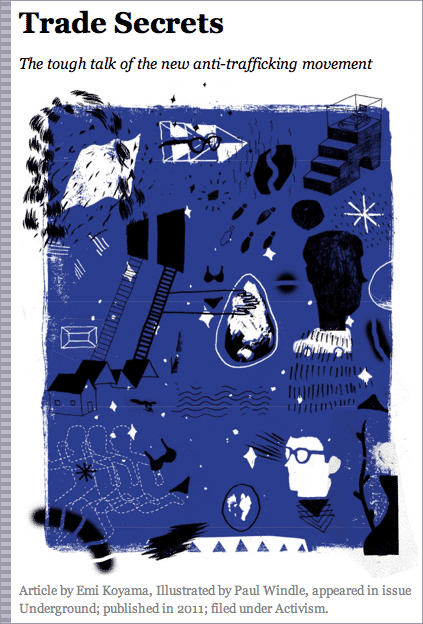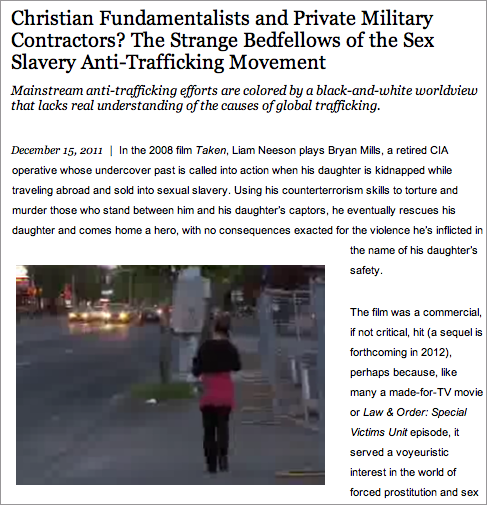Last week, I wrote about how Janus Youth, Portland area’s largest youth service provider, assisted the City’s raid on Occupy Portland encampment under the dubious premise that the camp “endangered” youth (rather than that it simply attracted youth who are already endangered due to lack of housing, opportunities, and services). I also discussed how it reflected Janus’ increasingly pro-police stance as it became further and further dependent on “anti-trafficking” funds.
But the reality of Janus’ betrayal of youth was much worse, as I found out when I attended a presentation about Portland’s CSEC (commercial sexual exploitation of children–which should actually say “youth” instead of “children” for CSEY) programs at the national runaway and homeless youth conference.
The presentation, titled “CSEC: A Collaborative Approach to Addressing Sexual Exploitation of Children in Your Community,” was presented by three individuals representing Janus Youth, FBI, and Sexual Assault Resource Center (which has a trafficked minor program inside a big church).
The person from Janus started off his presentation with a statement that he was going to say some critical things about his agency. His complaint: Janus workers were not very friendly to the police officers in the past.
For example, he continued, when police officers detain and deliver youth to the Janus service center for curfew violation and other reasons, youth are frequently angry at the police officer. They often complain that they have been brutalized, harassed, or otherwise treated unjustly by the officer. Social workers at Janus validated their feelings and helped them file grievances, which made police officers hostile to Janus.
Janus guy felt it had to change, so he told all of his staff to treat police officers “like their best friends.” As a result, police began to like Janus a whole lot more, and now they are such great partners. In other words, Janus has made a conscious decision to side with the police when youth feel violated and abused by the police, rather than affirming and validating youth’s experiences.
Janus also helped police officers get hold of a youth who was camping at Occupy Portland. Because many Occupy protestors were hostile to police officers, it wasn’t the best idea to send police officers into the camp in order to search a youth. Instead, they asked Janus worker to go into the camp to find the youth for them.
It was in the context of this intimate relationship between Janus and the law enforcement that the former provided the justification for the City to use its police force to forcibly evict youth who had chosen Occupy camp over Janus’ services, presumably to save youth from themselves.
The director of trafficked minor program at SARC spoke next, also describing friendly relationship with the law enforcement. She, too, criticized other feminist anti-violence projects that are skeptical of law enforcement, and discussed how SARC was different from those in that they value partnering with the law enforcement.
The person from FBI who works closely with the anti-trafficking division of Portland Police Bureau also repeated her satisfaction with the law enforcement’s relationship to service providers like Janus and SARC. She explained that the law enforcement specifically chose these two organizations to work with over other anti-violence projects because of their pro-police stances.
“Collaborations with Janus and SARC are great; it makes victims better witnesses for the prosecution,” she said. SARC person echoed this sentiment when she explained the benefit of SARC’s services: Because SARC isn’t a mandated reporter, youth feel safer disclosing their experiences to them. And once they disclose their experiences to someone, they are more likely to disclose to other service providers who are mandated to report, or even to the law enforcement.
In my opinion both Janus and SARC have perverted their mission to support youth when they bought into the structure that prioritize prosecution rather than empowerment and long-term well-being of their clients. It is probably true that someone who discloses once to a non-mandated reporter are more likely to disclose to someone else who will act on that information, but is it beneficial to the youth? It feels like the premeditated manipulation of youth they are supposed to empower.
Someone in the audience asked whether they thought a locked facility (i.e. some place youth cannot get out of on their own will) might be a good option for victims of sex trafficking. Both Janus and SARC persons were cautious, but the Janus person said it was more preferable to build a non-locked facility in areas far removed from the City (which of course is no different from a locked facility unless one has access to a vehicle). The SARC person claimed that over half of the women they are serving want to be locked up, which I find highly questionable. She made it seem like someone engaging in non-suicidal self-cutting should be locked up for her safety, which I completely disagree with, as I believe cutting can be a very useful coping strategy for many survivors (including myself).
Another person, a youth worker from Texas, asked the presenters to comment on the most recent Village Voice article which cites a study from John Jay College of Criminal Justice. Among many things, the study reports that only about 10% of the youth who trade sex in New York City have pimps, undermining the theory that youth survival sex equals “modern day slavery.”
The SARC person completely dismissed the study, claiming that most youth who trade sex have pimps, and suggested that researchers probably didn’t have enough rapport with the youth to discover the truth. But people I know from Safe Horizon/Streetwork, which reaches more street youth in New York than any other organizations there affirm that the John Jay study reflects their own understanding of reality. The youth worker from Texas also seemed to believe that the John Jay study to be valid, and seemed surprised to see SARC’s dismissive attitude.
In response, the SARC person characterized the “debate” over sex trafficking to be between those who believe sex work is an empowering choice versus those who disagree with that, clearly positioning herself in the latter camp. But this is a grotesquely unfair and dishonest characterization of the real debate here. The real debate is between youth-centered versus police-centered approaches, harm reduction versus paternalism, and reality-based versus ideological.
I also attended several other workshops on the topic, all of which turned out to be throughly dishonest and anti-youth.
For example, the workshop titled “Assisting Victims of Human Trafficking: A Collaborative Approach” was presented by two women from Rainbow House of Columbia, Missouri, which I was particularly interested in because I have engaged in sex trade as a teenager while living in Missouri and therefore I know something about the topic.
Their level of knowledge and awareness was dismal, as evidenced by their tacit acceptance of mythical “statistics” about youth in the sex trade. They also included “mail order bride” as an example of human trafficking, which doesn’t agree with the actual legal definition of trafficking, despite the fact they take advantage of the legal definition when it is convenient to do so as they characterize all sex trade by a minor as “modern day slavery.”
The presenters placed a huge emphasis on the role of Stockholm Syndrome as a way to explain why many youth defend people who are abusing and exploiting them. “Youth frequently go back to their pimps and traffickers because of brainwashing and Stockholm Syndrome,” they insist, but fail to mention the possibility that their services do not meet the youth’s needs.
Someone in the audience gave an unsolicited advice: “When a youth runs away from your services, try to locate them in the adult services section of Backpage.com!” Well, what about thinking about ways to make the services more attractive so that they don’t have to run away from you?
The Rainbow House people also gave a “story” of one of its clients, most likely without the explicit permission of the youth whose story was used, and I find such practice exploitative and offensive. They even told the audience that the youth did not admit to trading sex, but other clients told them about it; she eventually run away from Rainbow House. These details made their telling of her story even worse. I don’t understand why they can’t simply find a youth who consent to having their stories shared in this form.
The presenters demonstrated their cluelessness when they recommended that service providers learn and use street slangs in order to “make youth feel comfortable.” I can’t believe that they said this. Service providers certainly should learn and understand street slangs, but it is an extremely bad idea to use them unless they actually come from the street culture. Youth do not feel comfortable with people who are fake; in fact, they will completely distrust you when you present yourself as something that you are not. It is much better to simply own up to their status as (often white middle-class) college-educated professionals.
Further, someone in the audience asked the presenters about dealing with girls who recruit other girls in the youth services into sex trade, possibly for a pimp. The presenters replied that they have never seen that happening in their years of working at the youth shelter, which once again shows that they do not know what they are talking about.
Yet another workshop I attended was presented by Polaris Project, a prominent national anti-trafficking organization. Their presentation felt more like a cult seminar than a social service workshop, because the whole audience seemed to have “drunk the cool-aid” that dissociated them from the reality. Aside from repeating all the false “statistics” and the supposed spike in human trafficking during the Super Bowl (which there is none), their perception of sex trade was so unreal.
For example, Polaris vastly exaggerated the number of sexual acts that a typical “trafficked youth” (which is any minor who trade sex) performs, or the money pimp makes each year, giving the figure that is completely unrealistic. When the presenters began “brainstorming” for what the society associates with pimps, the audience responded that the society views pimps as benevolent protectors–which I highly doubt is what most people think about pimps. Interestingly, nobody mentioned how the word “pimp” has a racial connotation.
Overall, the conference was a painful reminder that most of the youth services are horrible and anti-youth. I sometimes feel jealous of youth today because there seem to be more resources for them than I had 20 years ago, but Youth Services Still Suck. There were several more presentations about trafficking of youth, but I had to go home early because I could not handle it any more.
On the last day of the conference, the closing keynote presenter was (predictably) Rachel Lloyd from Girls Education and Mentoring Services. I actually agreed with many things she said, such as how we must work toward fighting poverty if we truly cared about stopping sexual exploitation of youth.
But it was painful to hear her speak knowing that GEMS takes most of its clients from criminal justice system as an involuntary, court-mandated “services,” or that they do not accept any transgender girls and young women who need services, or that they do not honor gender identities and pronouns of female-assigned transgender or genderqueer youth who get mandated to receive their “services” like a prison sentence.
It was painful knowing, as she promoted her film, Very Young Girls, and her book, Girls Like Us, that girls shown in the film (who were court-mandated to be there) were not told how their images were being used, and that girls whose stories illustrate Rachel’s narratives throughout the book did not give permission for their stories to be told. I can’t write everything I know about GEMS here, but there are many other reasons I felt sad and in pain as I heard Rachel receive a standing ovation.
There seems to be so much desire in our society to reach out to the youth experiencing rough times, but the institutions that supposedly exist to provide services are often fundamentally flawed. Especially in this time of economic downturn (and hence greater reliance on government funding), more and more organizations are assuming their role as the extension of the law enforcement and the welfare system that dehumanize and abuse youth.
I think we need to replicate “Bad Encounter Line” system that Young Women’s Empowerment Project has developed in Chicago. BEL is “a way to report bad experiences you had with institutions such as police, the health care system, public aid, DCFS, CPS, etc.” that are “set in place to help” youth. The repots are published as zines, and used to introduce systems of accountability in social service fields.
I want to start this. Is anyone in Portland or Seattle area interested also?




